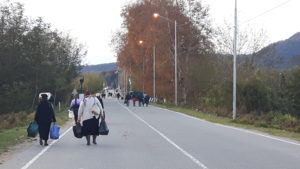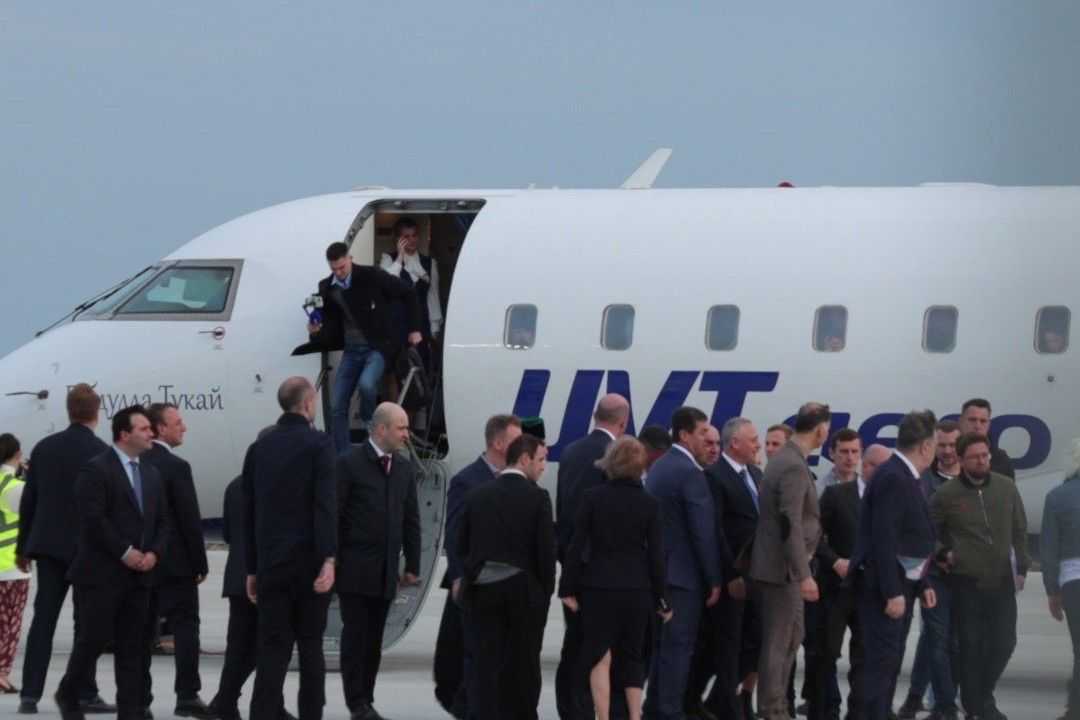

 On 5 March, the de facto government of Abkhazia closed two of the three remaining checkpoints between Abkhazia and Tbilisi-controlled territory — the Khurcha–Nabakevi (Bataiguara) and Orsantia–Otobaia (Bgoura) crossings.
On 5 March, the de facto government of Abkhazia closed two of the three remaining checkpoints between Abkhazia and Tbilisi-controlled territory — the Khurcha–Nabakevi (Bataiguara) and Orsantia–Otobaia (Bgoura) crossings.
The Abkhazian government amended the law on the state borders in March 2016, reducing the number of checkpoints ‘in order to better control the border’ as well as raising fines for ‘illegal border crossing’.
The law came into force in April 2016, a month after being adopted, and the Shamgona–Tagiloni (Taglan) and Pakhulani–Lekukhona (Alakumkhara) checkpoints were closed in August 2016.
When news of the Khurcha–Nabakevi and Orsantia–Otobaia closures was announced, ethnic Georgians in Gali (Gal) District protested the decision. People gathered in the village of Nabakevi and at the Enguri (Ingur) Bridge, the last remaining crossing.
Locals set up an initiative group which collected about 1,200 signatures demanding that the checkpoints remain open, and sent it to the local authorities in Gali. The authorities declared that the closures would go ahead and from 5 March, they will have to use the Enguri Bridge so as not to violate the law.
The EU condemned the decision and called on Abkhazia to maintain the checkpoints, as closing them ‘will be detrimental to the freedom of movement of the population, including school children, on both sides’ and will ‘likely increase the risk of incidents, especially detentions’.
Abkhazia’s Ministry of Foreign Affairs released a statement dismissing the EU’s position as ‘cynicism’.
‘This decision is fully consistent with the laws of the Republic of Abkhazia and the requirements to ensure reliable security of its citizens’ the statement reads, adding that capacity has been increased at the Enguri checkpoint, with repaired roads and a ‘comfortable bus run’ leading to it.
Following the closures, the US Ambassador to Georgia visited the two villages on the Georgian controlled territory, Khurcha and Orsantia.
Ambassador Ian Kelly said that the decision would obviously reflect on the lives of tens of people and their welfare. He said that people who live beyond the River Enguri are helpless. For example schoolchildren, who will now have to travel 50 kilometers to reach their schools with the new detour.
On 6 March, the American Department of State released a statement, in which it expressed a ‘deep concern’ regarding the closure of checkpoints.
The UN Office in Georgia expressed concern in a statement. ‘The people of Abkhazia will find it more difficult to access basic services such as healthcare and education and participate in economic activities and social events such as weddings, funerals and public holiday commemorations, as well as family gatherings across the dividing line. Notably, access to education for children who have been crossing to attend schools in their mother tongue will be impeded.’ the statement reads.
The Public Defender’s Office of Georgia also commented on the issue, saying that the decision was another step backwards in terms of protection of human rights.
‘It should be underlined that the checkpoints are used by schoolchildren and patients. Therefore, the decision mentioned above will violate their right to education and health. In addition, the number of illegal detentions will likely increase due to the fact that the locals will continue to use the nearby checkpoints or bypass routes’, the ombudsman writes.
On 3 March, Ketevan Tsikhelashvili, the Minister of Reconciliation and Civil Equality, said during her visit to Samegrelo that it would be a priority for Georgia to reverse this decision.
According to the Abkhazian government, about 1,500 Georgians cross over from Abkhazia every day, returning in the evening. Among them are school children who go to school in Georgian controlled territory.
The Abkhazian government also made penalties for violating border rules harsher. Fines for crossing illegally have increased to between ₽6,000 and ₽7,200 ($100–120) from the previous ₽600 ($10), and for repeated offences, jail terms of 15 days can be imposed.







